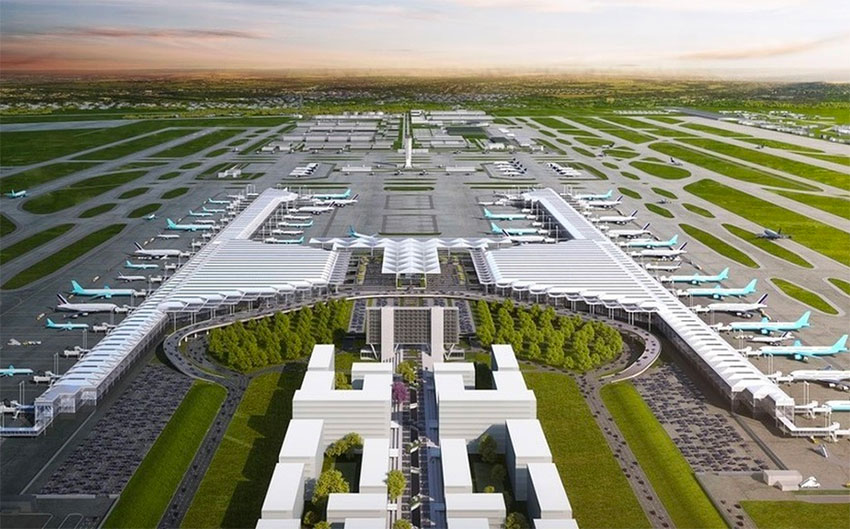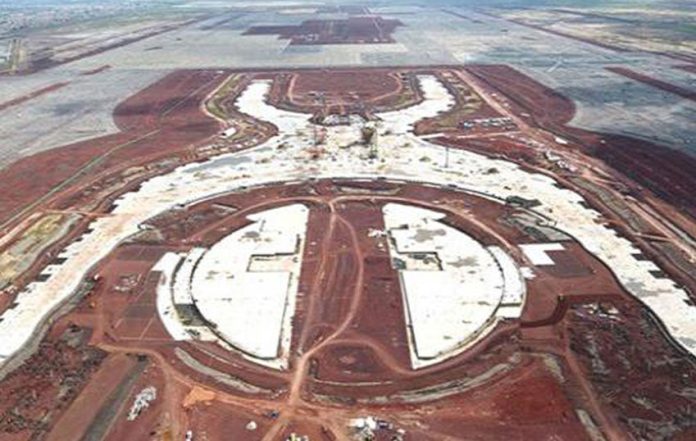The Ministry of National Defense (Sedena) paid almost 2 billion pesos to 45 shell companies to which it awarded supply contracts related to construction work at the new Mexico City International Airport (NAIM), according to a report by the newspaper El Universal.
Last week the Federal Auditor’s Office revealed that it had detected irregularities in spending by the previous government on the canceled airport project in 2018. Now, El Universal has revealed irregularities in expenditure on the same project in the preceding three years.
As fencing and drainage work was being carried out in 2015, 2016, and 2017 at the airport site in Texcoco, México state, Sedena signed agreements with the Mexico City Airport Group – the state-owned firm that was responsible for the project – and the National Water Commission that allowed it to contract companies to complete work for which it had been given responsibility without having to open a public tendering process.
In order to complete the work it was assigned, Sedena needed to contract hundreds of private companies, El Universal reported.
Sedena awarded all of the contracts it issued either directly or after a private tender invitation to a select group of just three individuals or companies, arguing that a public tendering process would not allow it to obtain the materials or services it required quickly enough, and that in some cases, it would place national security at risk.
The direct contracting model Sedena followed at the NAIM is the same model the ministry used to contract companies for 851 public works projects during the governments of former presidents Felipe Calderón and Enrique Peña Nieto, El Universal said. Other projects on which Sedena worked were also characterized by a lack of transparency and the use of shell companies, the newspaper reported.
The 45 airport contractors identified as shell companies by El Universal — following a review of 284 Sedena contracts obtained via transparency laws — received 1.78 billion pesos (US $93.7 million at today’s exchange rate) to supply goods and materials for construction work at the airport.
Sedena entered into a total of 117 contracts with the 45 shell companies. The supposed owners of 13 of them are prestanombres, or front men, El Universal said, explaining that they worked as security guards, builders, hairdressers and police or were supposedly beneficiaries of government welfare programs.
Efrén Sánchez Garibay, a low-ranking state police officer in Chiapas, is listed as a shareholder in one company that received about 1 million pesos for supposedly supplying concrete to Sedena, El Universal said. However, in a declaration of assets to the state Security Ministry, Sánchez said that he didn’t have interests in any companies and didn’t own any assets of significant value.
The names of three alleged owners of a construction company that entered into a contract with Sedena appear to have been taken from lists of people who signed up for agricultural subsidy schemes.
One of the alleged owners who spoke with El Universal on the condition of anonymity said that he was contacted by a “woman who worked on political campaigns” and that he subsequently signed documents and provided a copy of his electoral ID in order to sign up for a Ministry of Agriculture financial support program.

“I signed several documents but I never heard anything more about the [financial] support,” the man said.
Eight companies that entered into agreements with Sedena are on a blacklist of the Federal Tax Administration because they provided false information, have tax debts or couldn’t be located at their listed addresses, El Universal said.
One of them – Soluciones Empresariales Santori – appears to have been established specifically to provide services to Sedena at the Texcoco airport, the report said, noting that it was founded in February 2016 and seven months later was awarded the first of five contracts worth a combined total of 45.2 million pesos.
Santori signed its final contract with Sedena in February 2017 and six months later the company was dissolved. El Universal noted that while construction work on the airport was being carried out, Santori provided electrical materials to Sedena even though it was supposedly a financial services company.
There are six other companies like Santori that provided construction materials to Sedena but were registered as firms with a completely different purpose.
Modesta Martínez, the alleged owner of one of the firms, sold approximately 1.3 million pesos of wood to Sedena but when El Universal visited the company’s listed address in Puebla it found a juice stand. The female operator of the stand said that she didn’t know Modesta Martínez and that she has already provided information to the Treasury.
“This is my business and I don’t know anything. I just rent [the stand] and there’s no wood. I don’t know what you’re coming to look for, [people] already came to look for that person four times,” she said.
Many of the other companies that signed airport contracts had no prior experience in supplying construction materials and some of them were not registered with the Economy Ministry, El Universal said. The newspaper also found that many of the companies that were awarded contracts by Sedena had the same supposed shareholders, administrators and lawyers and were established on the same date at the same address and have the same telephone number.
Fernando Nieto Morales, a public administration professor and researcher at the Colegio de México who has a particular interest in public policy implementation and government corruption, told El Universal that Sedena has become a key player in priority infrastructure projects but explained that it is not a ministry that is known for being transparent about its activities.
“Sedena has increased responsibilities and we should take the time to hold them to account. The problem is that it’s not accustomed to transparency,” he said.
Nieto added that it would be preferable for the government to put other government departments that are accustomed to being transparent in charge of most public works projects and only give responsibility to Sedena for projects in which national security is at stake.
“This is a paradox because a lot of people in this country trust the army a lot because they believe that there is a chain of command, that orders are carried out and that this allows [their] actions to be more effective,” he said.
President López Obrador long argued that the new Mexico City International Airport was corrupt, using the claim as one of the main reasons to justify his decision to hold a public consultation on the project. After seven in 10 participants indicated that they favored converting the Santa Lucía Air Force Base into a commercial airport rather than completing the NAIM, López Obrador canceled Peña Nieto’s signature infrastructure project.
Construction of the Santa Lucía airport, located approximately 50 kilometers north of Mexico City in México state, began last October after the government was successful in overturning a series of court orders that held up the project for months.
The president has pledged that the new facility will be ready to open in early 2022 and that all information related to its construction will be made public.
Which government department is in charge of the project? The Ministry of National Defense, of course – what could go wrong?
Source: El Universal (sp)
